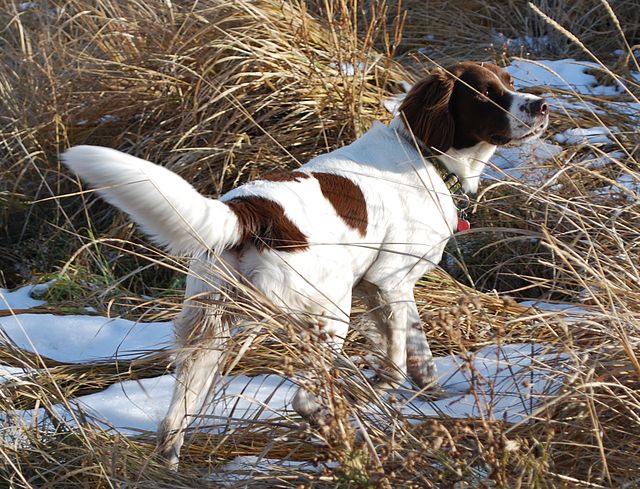


The Drentsche Patrijshond, also known as the Dutch Partridge Dog, is a medium-sized hunting breed from the Netherlands. Known for its versatile abilities as a pointer, retriever, and flushing dog, it is an intelligent and energetic breed that excels in field work. The Drentsche Patrijshond has a strong bond with its family and is known for its affectionate and gentle nature. These dogs are highly trainable and thrive in an active household that can provide them with plenty of mental and physical stimulation. Though they are primarily bred for hunting, they are also well-suited to life as a companion dog due to their friendly and easy-going temperament.
The Drentsche Patrijshond is one of the oldest and most versatile hunting dogs in the Netherlands. Its origins can be traced back to the 16th century, where it was developed as a pointer and retriever to assist hunters in finding and retrieving game, particularly partridges and waterfowl. The breed is believed to have been influenced by several European hunting breeds, including the Spaniel and the pointing breeds of France and Germany. Throughout history, the Drentsche Patrijshond has been a popular choice among Dutch hunters for its work ethic, intelligence, and versatility. In the 20th century, the breed nearly faced extinction, but dedicated breeders have worked to preserve the Drentsche Patrijshond, and it is now recognized by various kennel clubs, including the Fédération Cynalogique Internationale (FCI).
The Drentsche Patrijshond is a medium-sized dog with a well-balanced, athletic build. Males typically stand between 22 to 24 inches at the shoulder, while females stand slightly shorter at 21 to 23 inches. The weight of the breed ranges from 45 to 70 pounds. They have a dense, water-resistant coat that is typically a combination of long and short hair, providing protection in various weather conditions. The coat is usually a rich brown or liver color, with white markings or patches. The breed’s face is expressive, with dark eyes that convey an intelligent and alert expression. They have a long, well-muscled neck and a tail that is often carried low and gently curved. The breed’s ears are moderately long, and they have a well-developed chest and strong legs, which aid in their excellent stamina and hunting capabilities.
The Drentsche Patrijshond is an affectionate, gentle, and intelligent breed. They are known for being very loyal to their families and tend to bond closely with their owners. While they are calm and composed indoors, they can be quite active and energetic outside, especially when given the opportunity to engage in physical activities. These dogs are good with children and generally get along well with other pets, including other dogs. However, their strong hunting instinct may cause them to be interested in smaller animals, so supervision is important. The Drentsche Patrijshond is typically friendly toward strangers but may be reserved at first. They are eager to please and respond well to training but may require an experienced owner to handle their strong-willed nature. They are intelligent and independent, which makes them excellent working dogs but may present a challenge in terms of obedience if not properly trained.
The Drentsche Patrijshond is a highly energetic breed that requires plenty of exercise to stay healthy and happy. They are a working breed that thrives in active environments, and daily exercise is essential to prevent boredom and maintain their well-being. Regular walks, runs, and opportunities to explore off-leash in a secure area are ideal for this breed. Additionally, this breed enjoys engaging in dog sports such as agility, obedience training, and field trials. Their strong hunting instincts also mean they may enjoy games that mimic hunting behaviors, such as fetch or scent work. Without sufficient physical and mental stimulation, the Drentsche Patrijshond may become bored and may engage in undesirable behaviors. These dogs thrive in homes with active families who can provide them with regular exercise and challenges.
The Drentsche Patrijshond is an intelligent and independent dog, making it relatively easy to train, but it also means they can be a bit stubborn at times. Consistent, positive reinforcement-based training works best with this breed. Early socialization is important to help them develop into well-rounded dogs that are comfortable around strangers, other animals, and various environments. A well-socialized Drentsche Patrijshond will be friendly and confident in different situations. These dogs are eager to please their owners, so they typically respond well to training when it is done in a positive and rewarding manner. However, because of their strong hunting instincts, they may require extra attention to ensure they do not become overly focused on small animals during walks or off-leash activities.
The Drentsche Patrijshond is generally a healthy breed, but like all breeds, they can be prone to certain health issues. Common concerns for the breed include hip dysplasia, progressive retinal atrophy (PRA), and ear infections due to their floppy ears. Regular check-ups with a veterinarian are important to catch any potential health problems early. They also require regular grooming to maintain their coat, as it can become tangled or matted if not properly cared for. Brushing a few times a week is typically enough to keep their coat in good condition. Regular ear cleaning is important to prevent infections, and dental care should also be a part of their grooming routine. These dogs enjoy spending time in the outdoors, so protecting them from extreme weather conditions and providing a comfortable living environment is essential for their health.
The average lifespan of a Drentsche Patrijshond is around 12 to 14 years. With proper care, a balanced diet, regular exercise, and routine veterinary visits, they can enjoy a long and healthy life. As with any breed, it is important to monitor their health throughout their life and address any health issues promptly to help ensure they live a long, happy life with their families.
© copyright Dog Compendium 2024 - 2026